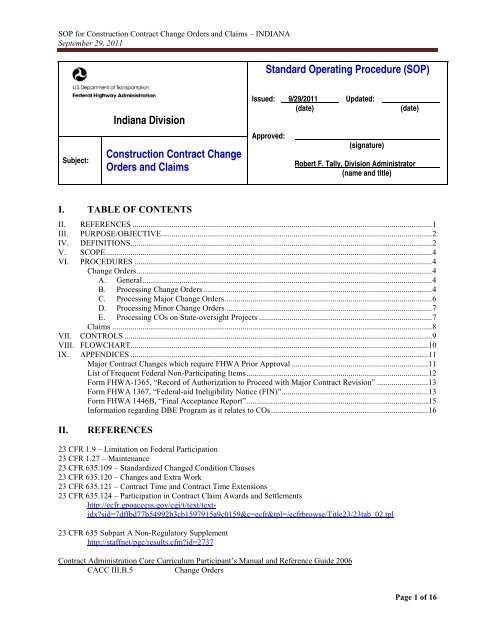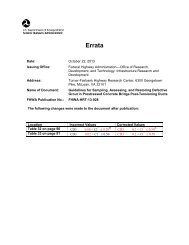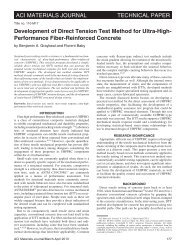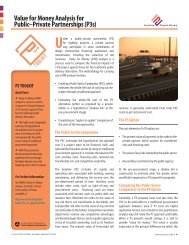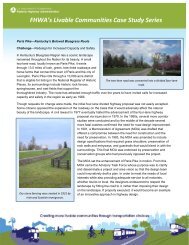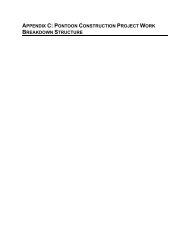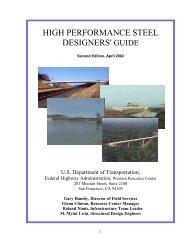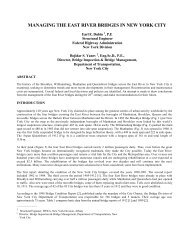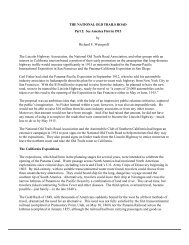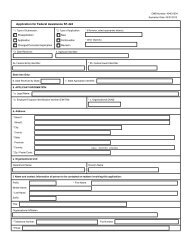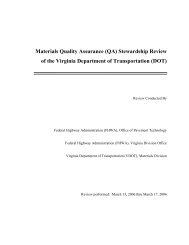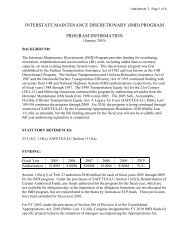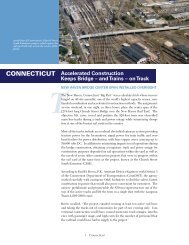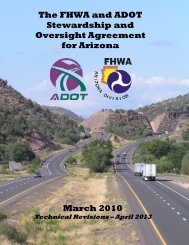Internal Control Document/Standard Operating Procedures
Internal Control Document/Standard Operating Procedures
Internal Control Document/Standard Operating Procedures
Create successful ePaper yourself
Turn your PDF publications into a flip-book with our unique Google optimized e-Paper software.
SOP for Construction Contract Change Orders and Claims – INDIANA<br />
September 29, 2011<br />
Subject:<br />
Indiana Division<br />
Construction Contract Change<br />
Orders and Claims<br />
I. TABLE OF CONTENTS<br />
<strong>Standard</strong> <strong>Operating</strong> Procedure (SOP)<br />
Issued: 9/29/2011 Updated:<br />
(date) (date)<br />
Approved:<br />
(signature)<br />
Robert F. Tally, Division Administrator<br />
(name and title)<br />
II. REFERENCES ................................................................................................................................................... 1<br />
III. PURPOSE/OBJECTIVE..................................................................................................................................... 2<br />
IV. DEFINITIONS.................................................................................................................................................... 2<br />
V. SCOPE ................................................................................................................................................................ 4<br />
VI. PROCEDURES .................................................................................................................................................. 4<br />
Change Orders ................................................................................................................................................. 4<br />
A. General .............................................................................................................................................. 4<br />
B. Processing Change Orders ................................................................................................................ 4<br />
C. Processing Major Change Orders ...................................................................................................... 6<br />
D. Processing Minor Change Orders ..................................................................................................... 7<br />
E. Processing COs on State-oversight Projects ..................................................................................... 7<br />
Claims ............................................................................................................................................................. 8<br />
VII. CONTROLS ....................................................................................................................................................... 9<br />
VIII. FLOWCHART.................................................................................................................................................. 10<br />
IX. APPENDICES .................................................................................................................................................. 11<br />
Major Contract Changes which require FHWA Prior Approval ................................................................... 11<br />
List of Frequent Federal Non-Participating Items ......................................................................................... 12<br />
Form FHWA-1365, “Record of Authorization to Proceed with Major Contract Revision” ......................... 13<br />
Form FHWA 1367, “Federal-aid Ineligibility Notice (FIN)”........................................................................ 13<br />
Form FHWA 1446B, “Final Acceptance Report” ......................................................................................... 15<br />
Information regarding DBE Program as it relates to COs ............................................................................. 16<br />
II. REFERENCES<br />
23 CFR 1.9 – Limitation on Federal Participation<br />
23 CFR 1.27 – Maintenance<br />
23 CFR 635.109 – <strong>Standard</strong>ized Changed Condition Clauses<br />
23 CFR 635.120 – Changes and Extra Work<br />
23 CFR 635.121 – Contract Time and Contract Time Extensions<br />
23 CFR 635.124 – Participation in Contract Claim Awards and Settlements<br />
http://ecfr.gpoaccess.gov/cgi/t/text/textidx?sid=7dffbd77b54992b3cb1597915a9c0159&c=ecfr&tpl=/ecfrbrowse/Title23/23tab_02.tpl<br />
23 CFR 635 Subpart A Non-Regulatory Supplement<br />
http://staffnet/pgc/results.cfm?id=2737<br />
Contract Administration Core Curriculum Participant’s Manual and Reference Guide 2006<br />
CACC III.B.5 Change Orders<br />
Page 1 of 16
SOP for Construction Contract Change Orders and Claims – INDIANA<br />
September 29, 2011<br />
CACC III.B.6 Claims<br />
http://www.fhwa.dot.gov/programadmin/contracts/index.htm<br />
Federal Highway Administration (FHWA) Area Engineer Manual 2010<br />
http://one.dot.gov/fhwa/CPMDSS/Workforce%20Management%20<strong>Document</strong>s%20Library/FINAL%20201<br />
0%20AE%20Manual%206-21-10%20_FINAL.pdf<br />
FHWA Order M1100.1A FHWA Delegations and Organization Manual<br />
http://www.fhwa.dot.gov/legsregs/directives/orders/m11001a.htm<br />
FHWA Indiana Division Delegation of Authority<br />
L:\Program\<strong>Internal</strong> Operations\Division Office Responsibilities\Delegation of Authority\Delegation of<br />
Authority (5-16-2006).doc<br />
Indiana Department of Transportation and FHWA Indiana Division Stewardship and Oversight Agreement, 2/2/07<br />
INDOT <strong>Standard</strong>s (http://www.in.gov/dot/div/contracts/standards/)<br />
INDOT <strong>Standard</strong> Specifications<br />
INDOT General Instructions to Field Engineers (GIFE)<br />
III. PURPOSE/OBJECTIVE<br />
The primarily purpose of this <strong>Standard</strong> <strong>Operating</strong> Procedure (SOP) is to define the policies, procedures, and<br />
guidance for the review, approval and determination of Federal participation of Contract Change Orders and<br />
contract claims for Full Oversight projects, in accordance with 23 CFR 635.120 and 23 CFR 635.124 respectively<br />
IV. DEFINITIONS<br />
Change Order (CO): This is a document issued during the construction phase of a project to change contract<br />
requirements. It can result in a change in costs, change in time allowed to construct the project, or both.<br />
Claim: Is a request for compensation, for a time extension, or for any other remedy arising from a dispute,<br />
disagreement, or controversy concerning respective rights and obligations under the contract. In simple terms, it is a<br />
continued demand for payment by the Contractor if payment has been previously denied under INDOT’s normal<br />
procedures for CO approval.<br />
Contract: Is a written agreement between the INDOT and the Contractor setting forth the obligations of the parties<br />
for the performance of and payment for the prescribed work. The contract includes the plans, specifications,<br />
estimates, and special provisions approved by the FHWA Division Office Transportation Engineer (TE), as part of<br />
project authorization.<br />
Contract Modification: It is any formal change to the construction contract. Changes may be unilateral, nonsubstantive,<br />
administrative type changes; formal agreements between INDOT and the contractor; or changes<br />
directed by INDOT without the contractor’s consent. These changes modify the plans, specifications, estimates, and<br />
special provisions approved by the TE.<br />
Dispute Resolution Board (DRB): This is a method of resolving disputes and claims between owners and contractors<br />
to avoid litigation. Typically the DRB would consist of a panel of three experienced, respected, and impartial<br />
reviewers.<br />
Division Administrator Approval (per 23 CFR 635.120): This approval level for COs has been delegated to the TE.<br />
Effective Date (23 CFR 635.120): The date in which only costs incurred after that date can be considered for Federal<br />
participation. It must be a date prior to commencing the work covered by the CO. For consistency, the Division has<br />
decided that the effective date for major COs shall be the date of the FHWA prior approval. Field approved COs are<br />
Page 2 of 16
SOP for Construction Contract Change Orders and Claims – INDIANA<br />
September 29, 2011<br />
effective the date of the construction inspection. The effective date of a minor CO is the date INDOT approves the<br />
CO. Subsequent documentation supports the eligibility determination. If work covered by the CO starts or is<br />
completed prior to the effective date, the CO is ineligible for federal-aid participation.<br />
Force Account CO: A special type of change order used when agreement cannot be reached between INDOT and<br />
the contractor, when the extent of new work is unknown or is of such character that a price cannot be determined to<br />
a reasonable degree of accuracy. In such cases, INDOT directs the contractor to perform the work and makes<br />
payment based on the contractor’s actual labor, equipment, and material expenses plus markups for overhead and<br />
profit. Normally, prior to directing the contractor to perform the work, INDOT performs suitable cost analysis to<br />
verify contractor’s proposed costs.<br />
Formal Approval – A written and signed document issued after FHWA has reviewed the complete CO material and<br />
determines that the change is eligible for Federal reimbursement. Normally the formal approval is given at same<br />
time as the prior approval. However, in the case of an emergency or unusual condition, prior approval may be given<br />
in advance verbally and ratified later with the formal approval.<br />
Major Change: Major change or major extra work is generally defined by 23 CFR 635.102 as a “change which will<br />
significantly affect the cost of the project to the Federal government or alter the termini, character or scope of work”.<br />
Under the 23 CFR 635.120 provision, any “Major Change” requires formal FHWA approval prior to the effective<br />
date of the change, meaning that work may not proceed until formal approval has been granted. Any change order<br />
to be executed under this category, requires FHWA prior approval. FHWA and INDOT have identified the changes<br />
shown in Appendix A as Major changes.<br />
Minor Change: This standard operating procedure defines this as a “non-major change”. Federal policy defines a<br />
“non-major change” as all changes that do not fall under the definition of a “major change”. They do not require<br />
FHWA prior approval, however, they do require formal approval. Such approval may be given after the work is<br />
performed.<br />
Prior Approval: A written and signed document issued for major COs. It is a required FHWA approval before<br />
commencing the work authorized by the CO. Normally the prior approval is given at same time as the formal<br />
approval. However, in the case of an emergency or unusual condition, prior approval may be given in advance<br />
verbally and ratified later with the formal approval.<br />
Participating: If the proposed change is eligible for Federal-aid participation, then full participation is granted<br />
without exception.<br />
Participating in-part: There may be instances where only portions of the CO work would be eligible. One such<br />
example is a CO to provide for extension and clean-out of a culvert pipe. Extension of the pipe would normally be<br />
eligible for Federal-aid participation, but not the clean-out (maintenance). It is the responsibility of the TE to clearly<br />
distinguish the eligible costs from non-eligible costs of the CO.<br />
Non-Participating: This is when the proposed change is not eligible for Federal-aid participation. See Appendix B<br />
for “List of frequent federal non-participating items”<br />
Site Manager: This is a comprehensive client/server based construction management tool developed by AASHTO.<br />
This system provides for data entry, tracking, reporting, and analysis of contract data from contract award through<br />
contract completion. It can be used by all levels of construction and materials personnel such as field inspectors,<br />
technicians, project managers, lab personnel, producer/suppliers, and contractors.<br />
Verbal Prior Approval: In the case when a major change needs to be implemented immediately due to an emergency<br />
or unusual condition, then the prior approval may be provided by FHWA in advance verbally to allow the work to<br />
commence and ratified later with the formal approval. However, this verbal prior approval does not guarantee<br />
Federal reimbursement. It is normally provided via phone from the TE to the PS/PS, although it may also be given<br />
through discussion with the PE/PS during a construction inspection.<br />
Page 3 of 16
SOP for Construction Contract Change Orders and Claims – INDIANA<br />
September 29, 2011<br />
V. SCOPE<br />
Primarily, this SOP is intended to ensure that proposed contract changes and potential claims on Federal-aid projects<br />
are properly reviewed and documented. Specifically, this SOP outlines the procedures to be used by the FHWA<br />
Indiana Division Office for those Federal-aid full oversight projects. In implementing this SOP, the FHWA Indiana<br />
Division Office (Division) will ensure that:<br />
• The work to be performed is eligible for Federal-aid participation,<br />
• Quality materials and acceptable construction practices are utilized,<br />
• The work in question is reasonable in consideration of project budget and schedule,<br />
• The work in question can be accomplished in accordance with the approved NEPA document for the<br />
project,<br />
• All changes/extra work are processed in accordance with 23 CFR 635.120, and<br />
• All claims are processed in accordance with 23 CFR 635.124.<br />
FHWA approves all COs on Full Oversight projects; and under the authority granted by FHWA per the existing<br />
FHWA/INDOT Stewardship and Oversight Agreement, approves all COs on State Oversight projects on behalf of<br />
the FHWA. In reviewing and approving contract changes on State Oversight projects, INDOT shall use procedures<br />
approved by the Division. INDOT procedures used to approve CO’s on State-oversight projects must be responsive<br />
to the provisions of 23 CFR 635.120 and 23 CFR 635.124, respectively. The Division will evaluate INDOT's<br />
procedures through process review techniques as identified through annual risk based assessments.<br />
VI. PROCEDURES<br />
The following procedures outline the process for submitting, evaluating, and approving changes in plans,<br />
specifications, estimates, materials, site conditions; and potential claims. These procedures outline the formal<br />
processes to be followed, but the TE shall consult with specialists from various functional units in the Division as<br />
applicable, and use informed engineering judgment to evaluate each particular case on its own merit.<br />
Change Orders<br />
A. General<br />
There are two types of COs – Major and Minor. See Definitions for more information. FHWA must approve all<br />
COs on full-oversight projects. FHWA must give prior approval (before work starts) for major COs. The section<br />
below entitled “Processing Change Orders” describes what must occur on all COs, regardless of the type of CO<br />
(major or minor). The three sections that follow describe additional information for processing major COs, minor<br />
COs, and COs process on State-oversight project.<br />
B. Processing Change Orders<br />
When reviewing a CO, it is necessary to evaluate the requested change with respect to:<br />
1. Federal-aid eligibility<br />
2. lmpact to Scope of Work<br />
3. Basis of Payment<br />
4. Adjustments to Contract Time<br />
Further information on each of these four points can be found in the Section III.B.5 of the Contract Administration<br />
Core Curriculum Manual and Reference Guide 2006.<br />
Eligibility Conditions – While determining if a CO should be approved, at least one of the following general<br />
eligibility conditions should be fulfilled:<br />
A better product at less cost<br />
Page 4 of 16
SOP for Construction Contract Change Orders and Claims – INDIANA<br />
September 29, 2011<br />
A better product in less time<br />
An equal product at less cost and/or contract time<br />
A better design for the actual field conditions<br />
Modifications due to unforeseen site conditions<br />
Eight required items – FHWA considers the following eight items in order for one to determine Federal eligibility<br />
of a change order (must include all applicable supporting documentations):<br />
1. Limits of the proposed change,<br />
2. Reason(s) for the proposed change,<br />
3. Who initiated/recommended the change, and the person’s involvement on the project,<br />
4. Clear and detailed description of the work to be done,<br />
5. Necessity for the work (if work is not done, what will be the consequence),<br />
6. Bid items involved,<br />
7. Half-size drawings as necessary,<br />
8. Full explanation, including price justification, for new bid items.<br />
If all information listed above is forwarded to the TE as for major change orders or reviewed in the field for minor<br />
change orders, it may normally be sufficient to fulfill the “adequate documentation” requirements of the regulations.<br />
However, more documentation may be needed. The TE should work with the PE/PS to acquire the required items.<br />
The level of detail required for the review should be commensurate with the magnitude of the proposed change<br />
order.<br />
All applicable supporting documentations must be attached to the request. Inadequate supporting documentation is a<br />
good reason for determining a CO to be non-participating.<br />
Design changes – Where a design change is proposed or recommended, the name of the designer or other functional<br />
unit expert should be included in the request, including their justification for the proposal or recommendation.<br />
Force Account method of payment – When approving CO work, the TE must also review and approve the basis of<br />
payment used or to be used. INDOT should be encouraged to settle the method of payment (bid item, agreed price,<br />
etc.) with the contractor (instead of using force account procedures). Force account procedures are appropriate only<br />
when agreement cannot be reached with the contractor, when the extent of new work is unknown or is of such<br />
character that a price cannot be determined to a reasonable degree of accuracy. The PE/PS is required to perform<br />
and adequately document a cost analysis of each negotiated contract change or negotiated extra work order. The<br />
method and degree of analysis can vary by project, but the analysis must substantiate the final compensation<br />
determination and is subject to the approval of FHWA. The cost analysis verification must be documented and filed<br />
as part of the project records by the PE/PS. Before the force account CO is approved by the TE, the TE must verify<br />
that PE/PS has accurately performed the required cost analysis, and documented these costs.<br />
Time Adjustments – When evaluating the work covered by the change order, time adjustment is a factor that must<br />
be considered. When the work affects an activity on the critical path of the contractor's operations and merits an<br />
adjustment, the contract time should be adjusted concurrent with approval of the CO. However, in those situations<br />
that warrant a deferred time determination, a supplemental CO must be prepared as soon as the CO work is<br />
completed. Its effect on the controlling item of work must be used as a basis for FHWA approval.<br />
Change orders requiring permits, environmental clearances and Public Interest Findings – FHWA approval of<br />
the required public interest finding for certain proprietary materials (23 CFR 635.411a), mandatory borrow/disposal<br />
sites (23 CFR 635.407a), or certain State furnished materials (23 CFR 635.411c), etc. must be completed prior to<br />
final approval of major COs that implement proprietary materials, mandatory borrow/disposal, State furnished<br />
materials, etc. Prior approval for these COs may be given only if the necessary permits, environmental clearances,<br />
and public interest findings are appropriately documented for the Division.<br />
DBE goals and COs – DBE contract goal applies to CO as well as to the original contract. See Appendix F –<br />
“Supplemental information regarding DBE Program as it relates to change orders” for more information.<br />
Page 5 of 16
SOP for Construction Contract Change Orders and Claims – INDIANA<br />
September 29, 2011<br />
Errors and Omissions – Engineering errors and omissions will occur on occasion during highway design and/or<br />
construction. Each such engineering error should be considered on its own merits to determine whether any<br />
corrective design or work is eligible for Federal-aid participation. Federal-aid participation in errors that may<br />
reasonably be expected to occasionally occur (despite the exercise of normal diligence) may be justified, as long as<br />
carelessness, negligence, incompetence, or under-staffing were not contributing factors. For consultant design errors<br />
and omissions, FHWA's policy is that the responsible consultant should pay for the cost of the new design, but is<br />
generally not held responsible for additional construction costs resulting from such errors, as long as the errors are<br />
not a result of gross negligence or carelessness.<br />
Adequate environmental clearance – Contemplated changes should be evaluated by the TE in coordination with<br />
the applicable Division environmental specialist to identify any effects on environmental mitigation commitments,<br />
permit conditions, or agreements with resource agencies, and to determine whether new social, environmental or<br />
economic issues have been introduced that need to be addressed under applicable Federal, State, or local law.<br />
Environmental clearance on any project is valid only for the work described in the authorized PS&E submitted.<br />
Substantial changes could require amended or additional environmental clearance. COs that modify project limits<br />
must be cleared through the environmental process before the change order can be approved and work started.<br />
Non-participation – The reason for non-participation (in whole or in part) should be explained on the CO or noted<br />
by the TE when approving the CO. For major COs, it is noted on the CO by the TE. For minor COs, it is noted in<br />
the inspection report. If rejection of the proposed major change is due to incomplete and/or unsatisfactory<br />
supporting documentations, the TE is encouraged to give the PE/PS the opportunity to provide additional supporting<br />
documentation, for consideration in determining federal-aid participation. If the TE is unable to secure additional<br />
documentation from the PE/PS that may enable FHWA to participate in full or in-part, the TE will indicate such in<br />
the CO final approval, and state that the rejection is final.<br />
C. Processing Major Change Orders<br />
When a major CO is required on a full oversight project, early communication between the INDOT Project<br />
Engineer/Project Supervisor (PE/PS) and the TE is essential to assure that the changes being proposed are in<br />
conformance with the standards and prior approval requirements of FHWA. The PE/PS is responsible for notifying<br />
and forwarding all applicable information to the TE for evaluation and approval.<br />
Prior approval required – For all major COs, the TE’s review and approval of the CO must occur prior to the work<br />
commencing.<br />
The following describe the general CO approval process (see flowchart in Section VIII):<br />
1) Receive FHWA Form 1365 with eight required items and supporting documents attached – When a<br />
major change is warranted, the PE/PS notifies the responsible TE assigned to the INDOT District via<br />
electronic mail and transmits in PDF form the completed FHWA Form 1365 (Appendix C) to receive<br />
formal prior approval. The information submitted must at least include the above “eight required items”.<br />
2) TE reviews major CO –<br />
a) The TE reviews the FHWA Form 1365 that was completed down through the “Method of Payment”<br />
box and submitted by the PE/PS in accordance with 23 CFR 635.120.<br />
b) Any major CO that has been executed and work performed or started without the required formal<br />
FHWA prior approval, is in violation of the 23 CFR 635.120 provisions. Consequently, it is ineligible<br />
for federal-aid participation.<br />
c) If the request addresses the “eight required items” in sufficient detail and to the satisfaction of the TE,<br />
then the CO will be approved.<br />
d) Specific performance criteria regarding review and approval times are in the FHWA and INDOT<br />
Stewardship and Oversight Agreement. TEs are encouraged to limit the duration their review and<br />
approval of a major change order request to 5 working days.<br />
Page 6 of 16
SOP for Construction Contract Change Orders and Claims – INDIANA<br />
September 29, 2011<br />
3) TE signs major CO – If complete and satisfactory supporting documentation is attached to the request and<br />
no additional supporting documentation is necessary, the TE will then electronically:<br />
a) Sign the form.<br />
b) Note the approval effective date of the major CO. The approval effective date of the major CO will be<br />
the date the TE acknowledges that the “eight required items” have been addressed.<br />
c) Identify and explain the type of FHWA approval (“Fully Participating” or “Participating-in-Part” or<br />
“Non-Participating”). For a list of frequent Non-Participating items, see Appendix D.<br />
4) Return and file major CO – At the conclusion of the FHWA approval action, the signed PDF of the CO<br />
is:<br />
a) Retained in the Division's post award project file for the project.<br />
b) Enter applicable CO data into the Division Project Tracking Database.<br />
c) Sent to the PE/PS by electronic mail as soon as practical, to allow the work to commence or to inform<br />
the PE/PS of our rejection of the proposed major change.<br />
d) Furnished to the Division Office Construction Program Manager for information and tracking of<br />
trends, if determined to be non-participating.<br />
Verbal prior approvals – In cases of an emergency or unusual condition, prior approval can be requested via a<br />
phone call to the TE, from the PE/PS (when emergency or unusual conditions justify it) or through discussion with<br />
the PE/PS during a construction inspection. Normally, prior approval requested via phone call by the PE/PS, must<br />
be responded to verbally within one hour of the request. If the TE cannot be contacted, then the PE/PS should be<br />
directed to another TE, their TL, ADA or DA. Such approval does not guarantee Federal participation and must<br />
thereafter be ratified with formal approval as soon as practicable. The request for formal approval should describe<br />
the details of FHWA’s prior approval. An example of an unusual condition that justify FHWA verbal approval to<br />
continue work is when during excavation, a contractor encounters an underground utility that should have been<br />
relocated in advance of the scheduled work in this location. Under this circumstance, to avoid delaying the<br />
contractor from continuing work, the PE/PS should immediately notify the TE by phone, discuss the situation and<br />
receive verbal prior approval.<br />
D. Processing Minor Change Orders<br />
For minor changes, FHWA prior concurrence is not required. However, as with major changes, minor changes also<br />
require formal approval, but such approvals and type (i.e., participation determination) may be given retroactively at<br />
the time the TE conducts construction inspections. TEs will document minor COs reviewed in the construction<br />
inspection report by listing the COs reviewed. Those approved will include the effective date and the participation<br />
determination (“Fully Participating” or “Participating-in-Part” or “Non-Participating”). Reasons for any portion of<br />
the CO that FHWA will not participate in should be adequately explained.<br />
E. Processing COs on State-oversight Projects<br />
INDOT approves all change orders on State-oversight projects. FHWA monitors INDOT control documents, such<br />
as INDOT’s GIFE and Change Order Policy, to evaluate how INDOT takes Federal actions on behalf of FHWA on<br />
State-oversight projects. FHWA will at least evaluate INDOT’s methods for documenting the following Federal<br />
actions:<br />
Prior concurrence of major COs<br />
Eligibility determinations when providing final approval<br />
FHWA also conducts construction inspections on State-oversight projects each Federal fiscal year. The number<br />
conducted equals to a percentage of number of projects anticipated to be authorized for construction in that year.<br />
FHWA will review all approved COs on a project at the time of each inspection to determine if they have adequate<br />
supporting documentation and if appropriate decisions were made regarding Federal participation.<br />
Page 7 of 16
SOP for Construction Contract Change Orders and Claims – INDIANA<br />
September 29, 2011<br />
Claims<br />
Occasionally, a major CO is issued to cover costs of a contract claim. In general, the eligibility for and extent<br />
of Federal-aid participation in contract claim awards is determined on a case-by-case basis. However, early<br />
coordination with the TE and involvement of the TE needs to be initiated by INDOT is necessary to allow<br />
time and flexibility to work out specific details, and ensure that Federal concerns are being addressed, as well<br />
as preserving for INDOT the potential Federal-aid eligibility of the claim. For any CO that is prepared to<br />
cover the costs a claim, the TE must review all related supporting documentation to ensure that there is a<br />
legal and contractual basis for the claim. If adequate justification is not provided, the CO will be made<br />
non-participating.<br />
In order for FHWA to participate in whole or in part in a claim, FHWA must provide prior concurrence<br />
before any form of payment (not just a CO) is made to a contractor resulting from a claim, Review Board<br />
determination, Exception to Project Record Final Estimate (PRFE), District and/or Central Office<br />
determination, or Arbitration; Supplemental COs to all of the above.<br />
The initial contact point for the TE to be aware of potential claims on full oversight projects is at the<br />
construction inspection. The PE/PS and the project file should be consulted to determine if the contractor has<br />
filed Notices of Potential Claim. The TE should note in all inspection reports whether any notices of potential<br />
claim have been received, and the actions taken by the PE/PS to resolve them. At final acceptance, the TE<br />
should note all unresolved claims in the Final Acceptance report, FHWA Form 1446B (Appendix E).<br />
Unresolved potential claims turn into claims that are elevated to arbitration or mediation proceeding, administrative<br />
board review, court, negotiated settlement, or other contract claim settlement proceedings. INDOT will invite the TE<br />
to claim settlement meetings, but the TE should not participate actively in the resolution process. Once an agreement<br />
is reached, INDOT will submit a major CO to the applicable TE to cover the cost of the award or settlement and<br />
request federal-aid participation. In this submittal, INDOT shall indicate the legal and contractual basis for the<br />
claim, and also include cost data and other facts that would support the award or settlement. Federal-aid<br />
participation shall be supported by INDOT audit of the actual costs incurred by the contractor, unless FHWA<br />
determines that the audit is not warranted. As long as the conditions detailed in 23 CFR 635.124(d) are met, FHWA<br />
will generally participate in the award or settlement even if the amount of the award or settlement is more than an<br />
amount INDOT can justify.<br />
Payment of interest is authorized as an eligible Federal participating cost if the State has a statute that allows it and<br />
certain other conditions concerning diligence of processing the case are met. Several cost items that are ineligible<br />
for federal-aid participation are (to mention a few) – anticipated profits and opposing party attorneys' fees. If<br />
INDOT receives compensatory damages through the claims process, a credit is required for the Federal share of<br />
such recovery.<br />
In reviewing and approving major COs for contract claims award or settlements, the TE shall ensure that the<br />
requirements of 23 CFR 635.120 and 23 CFR 635.124 respectively, are met. Since not all items of work, costs, and<br />
time may be eligible for federal-aid participation, lump sum awards or settlements shall be broken down into the<br />
various items of works and their respective costs. This allows the TE to make informed eligibility determinations.<br />
The TE shall file approved or rejected COs for claims awards or settlements in the Division's post award project file<br />
for the project, and a copy sent to the INDOT electronically or by fax. If the CO is not approved for full federal-aid<br />
participation, the TE should use the prescribed method for notifying the State of noncompliance issues (essentially,<br />
complete and transmit the FIN, Form FHWA 1367 to INDOT).<br />
NOTE:<br />
Construction inspections are conducted as often as possible on full-oversight projects. The TE may not be able to<br />
visit and conduct construction inspections in the time allocated in the contract for construction of these projects. The<br />
TE should endeavor to conduct at least one construction inspection of such contract prior to the final acceptance. If<br />
the TE has not done so at the time the PE/PS is preparing the “proposed final estimate”, the PE/PS will inform the<br />
Page 8 of 16
SOP for Construction Contract Change Orders and Claims – INDIANA<br />
September 29, 2011<br />
TE of this. The TE must then arrange to visit the project and conduct both the construction inspection and final<br />
acceptance of the project to include determining eligibility of all processed minor COs. The TE must coordinate<br />
with the PE/PS to ensure that a final inspection is conducted by FHWA on Full-oversight projects before the PE/PS<br />
transports the project files to the INDOT Central Office for closeout.<br />
All Major and Minor COs are to have had written approval action taken by the TE and documented in FHWA’s post<br />
award project file before the final acceptance is approved by the TE. Otherwise, it must be done at any time prior to<br />
final voucher approval. FHWA should have already provided final approval of all Major CO’s before the work for<br />
those CO’s was initiated. There may be some unapproved minor CO’s remaining, which can be reviewed and<br />
approved during the final inspection.<br />
The final inspection report should be conducted and the TE should request certain information for final acceptance,<br />
including the CO Summary Report. Information in addition to the final inspection report and the final acceptance<br />
report needed to process the Final Acceptance Report may be found in the Division’s SOP for Project Closeout.<br />
The TE will use information on processed COs in the Division’s post award project files to verify that the CO<br />
Summary Report from INDOT reflects and accounts for FHWA’s eligibility determinations (participating or<br />
participating in-part or non-participating). At the time the Final Voucher request is received from INDOT, the TE<br />
will compare the Final Acceptance costs against the Final Acceptance costs submitted by INDOT, to ensure the CO<br />
costs are accurately documented. Once the TE verifies all project expenditures to be satisfactory or unsatisfactory,<br />
the Division’s Financial Manager will be advised accordingly.<br />
VII. CONTROLS<br />
The FHWA Delegations and Organization Manual delegates the approvals of COs and claims to the Division<br />
Administrator. The DA has further delegated the approval of these actions to the TEs.<br />
Electronic copies of all approved FHWA Form 1365, “Record of Authorization to Proceed with Major Contract<br />
Revision will be placed in FHWA’s own post award project file and applicable data recorded in the Division Project<br />
Tracking Database. This form is used to document FHWA prior concurrence and final approval of major COs.<br />
If the TE is unable to secure additional documentation that would enable the TE to participate in whole with a CO,<br />
then their team leader will review the CO prior to the TE indicating non-participating or participating in-part in the<br />
CO final approval. The TE will also consult with their team leader prior to denying full participation in a claim.<br />
<strong>Control</strong>s are also monitored through the final acceptance and final voucher process. The process of closing out<br />
Federal-aid construction projects, including the preparation of final acceptance reports, is an important project<br />
control function. The TE is responsible to ensure that all CO issues are resolved and all necessary items are received<br />
before the final acceptance report is written and approved.<br />
A copy of all COs determined to be non-participating shall be furnished to the Division Office Construction<br />
Program Manager for information and tracking of trends.<br />
The TE will use information on processed COs in the Division’s post award files to verify that the CO Summary<br />
Report from INDOT reflects and accounts for FHWA’s eligibility determinations (participating or participating inpart<br />
or non-participating).<br />
At the time the Final Voucher request is received from INDOT, the TE will compare the final acceptance costs<br />
against the Final Voucher costs submitted by INDOT, to ensure the CO costs are accurately documented<br />
Page 9 of 16
SOP for Construction Contract Change Orders and Claims – INDIANA<br />
September 29, 2011<br />
VIII. FLOWCHART<br />
Page 10 of 16
SOP for Construction Contract Change Orders and Claims – INDIANA<br />
September 29, 2011<br />
IX. APPENDICES<br />
Major Contract Changes which require FHWA Prior Approval<br />
FHWA and INDOT have agreed that the following are major changes that warrant FHWA prior approval:<br />
1. Any change order that costs $50,000 or greater.<br />
2. Any change order that result in a contract time extension of 10 or more days.<br />
3. Changes to, or requiring of, mandatory disposal or borrow sites – (Public Interest Finding (PIF) and/or<br />
NEPA clearance may be needed).<br />
4. Any revision due to a Cost Reduction Incentive Proposal (CRIP).<br />
5. Any form of payment to a contractor resulting from a claim, Review Board determination, District and/or<br />
Central Office determination, or Arbitration.<br />
6. Any change order action that would result in a waiver to the "Buy America" requirements.<br />
7. Any change to the following:<br />
• Method of payment – (Force Account)<br />
• Proprietary material for which specific or blanket approval has not been previously given<br />
8. Alterations to the intent or scope of the Contract or character of the work, including revision of the project<br />
limits.<br />
9. Revisions to geometric design of the mainline roadway, ramps, frontage roads or<br />
Crossroads.<br />
10. Revisions to structural section of the pavement, including, but not limited to subgrade, subbase,<br />
performance graded binder grade, pavement type, pavement depth, individual pavement courses and<br />
aggregate designations, type or quality of materials to be furnished, such as changing the individual<br />
aggregate base to a asphalt concrete material.<br />
11. Additions, deletions, changes or relocations to bridges or structures that affect the functional scope and<br />
intent of the approved design.<br />
12. Deviations from planned access control, including drives or pedestrian access features<br />
13. Revisions to the specifications, special provisions or other contract requirements, including approved<br />
provisions for maintaining traffic.<br />
14. Revisions that result in new environmental impacts, changes in previously permitted activities or reductions<br />
in environmental mitigation measures provided for in the Contract.<br />
15. When the change is due to consultant/SDOT design error or omission that is as a result of carelessness,<br />
negligence, incompetence, or under-staffing.<br />
NOTE: For the purpose of processing COs to meet the FHWA policy, 23 CFR 635.120/121/124, all other changes<br />
that do not fall under the above category are processed as minor changes, and do not require FHWA prior approval.<br />
However, they require FHWA formal approval.<br />
Page 11 of 16
SOP for Construction Contract Change Orders and Claims – INDIANA<br />
September 29, 2011<br />
List of Frequent Federal Non-Participating Items<br />
Work outside the highway right-of-way without permits, etc.<br />
Work outside the limits of the project (unless necessary to implement project; traffic control, etc.) Work<br />
performed outside the NEPA limits of the project may jeopardize federal funding for the project.<br />
Adjustment of private facilities (signs, fences, lawn sprinklers, etc., unless covered as a part of a right-ofway<br />
agreement or permit.)<br />
Storm and sanitary sewer work and other drainage or utility work that is not a result or purpose of the road<br />
or bridge work. Example: replacing sewer leads that were not in conflict with the construction activity<br />
proposed.<br />
Excessively expensive treatments that do not appear to be in the public interest. This could include<br />
expediting the project for a questionable purpose, or proposing the use of very extravagant roadway<br />
treatments or street side appurtenances.<br />
Significant hauling or transportation charges of salvaged items to INDOT’s or agency garages or storage<br />
sites for future use on non-federal projects. Hauling for less than 5 miles from the project site has been used<br />
by some STD construction engineers as a reasonable distance to haul material.<br />
Non-conforming work such as substandard details, designs determined undesirable or discontinued because<br />
of poor performance. Example: A588 guardrail, salt susceptible roadside plantings, etc.<br />
Payment for items that are the responsibility of others. Such as relocation of utilities located within the<br />
right-of-way, relocation of public facilities outside their corporate limits, accident damage that is the<br />
responsibility of others (driver, owner, insurance company, etc.)<br />
Payment for work done by an unapproved subcontractor.<br />
Local agency force account work that is not approved as cost effective.<br />
Payment for betterments that are not currently part of the project. Example: payment for excess sizing of<br />
sanitary sewer adjustment for future development. The additional cost over replacement-in-kind should be<br />
borne by the owner of the facility being adjusted.<br />
Payment for items that should typically be considered maintenance work by the owner agency. Examples:<br />
graffiti removal, snow plowing, trash removal, mowing roadsides, etc.<br />
Payment for rework.<br />
Specifying use of proprietary items, (i.e., specific brand name or single manufacturer items such as Eagle<br />
controllers, 3M sign sheeting, Caterpillar diesel, Hewlett Packard computer) unless:<br />
o Suitable number of other proprietary items or generic items are allowed.<br />
o INDOT certifies (via PIF) proprietary item is essential for synchronization with existing highway<br />
facilities or that no equally suitable alternate exists.<br />
o Proprietary item is used for experimental purposes.<br />
o FHWA finds it is in the public interest to use a proprietary item.<br />
Page 12 of 16
SOP for Construction Contract Change Orders and Claims – INDIANA<br />
September 29, 2011<br />
FORM FHWA-1365, “RECORD OF APPROVAL FOR CONTRACT<br />
CHANGE ORDER<br />
Page 13 of 16
SOP for Construction Contract Change Orders and Claims – INDIANA<br />
September 29, 2011<br />
Form FHWA 1367, “Federal-aid Ineligibility Notice (FIN)”<br />
Page 14 of 16
SOP for Construction Contract Change Orders and Claims – INDIANA<br />
September 29, 2011<br />
Form FHWA 1446B, “Final Acceptance Report”<br />
Page 15 of 16
SOP for Construction Contract Change Orders and Claims – INDIANA<br />
September 29, 2011<br />
Information regarding DBE Program as it relates to COs<br />
A recipient's DBE Program applies to all its Federal funded contract, including change orders to an existing contract<br />
which have more than a minimal impact on the contract amount.<br />
If there is a change order to a contract on which there is a DBE contract goal, then that contract goal applies to the<br />
change order as well as to the original contract. This is true regardless of whether the recipient or the contractor<br />
initiates the change order.<br />
For example, suppose that a recipient awards a $1 million contract to Firm X. The contract goal is 15 percent. Firm<br />
X meets the contract goal by obtaining DBE participation from subcontractors or supplies (only 60% of supply<br />
contract amounts can be applied toward meetin ag DBE goal) amounting to $150,000. Part way through<br />
performance of the contract, the recipient determines that additional work is necessary, and issues a change order<br />
that will add $500,000 to the total contract price. The 15 percent contract goal applies to this additional $500,000.<br />
To meet the contract goal as applied to the change order, Firm X would have to make good faith efforts to obtain an<br />
additional $75,000 in DBE participation. It could meet this obligation either by obtaining the additional $75,000 in<br />
work by DBE subcontractors or suppliers or by documenting good faith efforts.<br />
The recipient would determine, on a case-by-case basis, what would constitute good faith efforts in the context of a<br />
particular change order. This could include modifying the contract goal amount applicable to the change order if<br />
circumstances warrant.<br />
There may be situations in which a change order has such a minimal effect on the overall contract amount or the<br />
expected DBE participation on a contract that it would not be sensible to alter DBE requirements on a contract that it<br />
would not be sensible to alter DBE requirements affecting the contract. If a recipient believes that a change order<br />
has such a minimal effect, the recipient should contract the relevant INDOT’s DBE Program Manager for guidance<br />
on whether it is necessary to alter DBE requirements affecting the contract.<br />
Page 16 of 16


